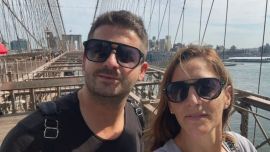Among the thousands of Venezuelans driven to Argentina by the humanitarian crisis devastating their country are many professionals, businessmen and multinational executives. Today they barely survive on menial jobs such as cleaning offices, working as greengrocers or ironing clothes, often with no formal legal employment.
In light of this situation, human resources specialist Yrina Morgado decided that she had to help her compatriots.
“We used to be an immigrant, not an emigrant country. This just doesn’t run in our blood. Our culture does not accustom us to abandoning our families,” she told Perfil, describing herself as “Venezuelan by birth but Argentine at heart.”
Speaking from her office in Tigre where she lives with her “team,” as she describes them (her husband Alex and her children Fabrizio and Dakota), Yrina defines herself as “lucky” because she arrived here already with a job and relatives waiting here to receive he. That support was “important,” she says.
Her case “was very different from many, but I still place myself in the shoes of those who have had to undergo so many hard things. It makes me very sad, she says. “There are many other Venezuelans who have not been so lucky. I see so many families arriving with children, for whom it has not been easy to leave Venezuela, travelling for up to a fortnight on buses and slogging it out on foot from one country to the other.”
PLANES AND BUSES
In recent months, social networks have been buzzing with various controversies regarding the Venezuelan exiles in Argentina, suggesting that only the wealthier classes come to the country since the poorer can only afford to leave Venezuela on foot.
That may have been the case in the beginning, said Vicenzo Penza, the president of the Asoven association of Venezuelan residents in Argentina. During the “first years of the immigrant wave in 2015 to 2017, when there were more professionals and less family groups.”
Yet Yrina recalls that even among those first immigrants, there were “some sleeping out in the open or eating oranges or mandarins because they did not have anything else.”
Today, points out Penza, you are seeing a wave of immigration “with less means. We notice that with the people who come, for donations and looking for winter clothing. Before it was a father or mother coming to save up the money and bring the rest here. They flew in; now they bus in, crossing all Brazil or the Andes in family groups with more difficulties than before. That has been the case since last year. This immigrant group is different,” he affirms.
SUFFERING
A trained accountant and headhunter, among other qualifications, Yrina feels the need to help her compatriots. “I’m going to help them because I know a lot about the suffering and hunger which that person is experiencing. I aim to do my little bit,” she says.
Morgado started training immigrants (mostly Venezuelans but also other nationalities). The objective: to help them get to know their strengths, overcome their failings and thus sell themselves and their CVs better to different companies. “The Venezuelan arrives here with his degree and thinks they have to leave it in their suitcases, that they have to start from scratch – raw before ripe, as we say in Venezuela.”
To such people, Yrina suggests the possibility of upgrading their CVs, encouraging them. “ W hy begin from scratch if this is a land of opportunity? If I was received, why not you?”
Yrina points out that when the situation of an immigrant improves, “they do not only grow as a person. The quality of life of their family improves and we should remember that all those leaving their families in Venezuela send them money.” And it’s not just a question of helping “Mum, Dad or the kids; we’re also talking about uncles and aunts, even friends” with these money remittances.
WHY ARGENTINA?
As to why Argentina was chosen by those seeking new horizons, Asoven’s Penza considers that it is fundamentally a question of paperwork.
“It’s the easiest country to which to emigrate. We have the privilege of belonging to [the] Mercosur [regional bloc] as citizens, although not as a country, and that helps.”
In the case of youths, the Argentine government published in the Official Gazette on 9 February, 2018, its decision to grant "preferential treatment” to students coming from Venezuela in the “administrative process of recognising their studies,” exempting them from having to legalise their educational documentation, as is required of all foreign students attending institutions in Argentina.
Yrina also points out that the language also influences when it comes to choosing our country. Furthermore, “it is well-known that Argentina receives foreigners very wellin every sense, giving them plans, education, jobs and equality of opportunity. I don’t know where the myth of the cocky Argentine came from.”
Penza underlines that “everything hinges on obtaining a DNI identity document: without a DNI all paperwork is delayed.” And he explains that “a doctor, an engineer or a teacher will have more chance than a lawyer, who will have to restart their studies.” Such was the case for Inexi Bujosa, a Venezuelan had to work informally until she had her papers.
According to Interior Ministry data, the entries between 2015 and 2018 are dominated by engineers (16,234 in total) like Ybelice Flores, who came with her husband because their son was studying here, or Alexjandra Olaizola. They are followed by business managers, entrepreneurs and accountants (10,860) and health professionals (4,517).
According to Interior Ministry data from mid-2019, most Venezuelans have settled down in the Capital and Buenos Aires Province, but also Córdoba and Neuquén. In this respect Yrina Morgado (the youngest of 20 siblings), explains that Buenos Aires, apart from being seen as “a beautiful city where there are more possibilities,” is also where there is the biggest concentration of Venezuelans because “it’s a form of support.”
She concludes: “It’s like returning to the streets of your city".
‘You’re alone against the world’
HÉCTOR BERMÚDEZ
"I arrived in Buenos Aires from Caracas on 25 February, 2018. I’m an industrial engineer, aged 40. I didn’t want to start my life here as an illegal immigrant. When you emigrate, consciously or unconsciously, you break loose and cut an umbilical cord tying you to your original country which you had never felt before. That’s a risk. You’re alone against the world. And that fear can paralyse you or motivate you, depending on the attitude you take as a person. In selecting the country to which you emigrate, you have to think carefully – the paperwork and the economic and job possibilities. I gave greater weight to what the Argentine citizen is like. I had already been here and Argentines are more open to immigrants. In May I had my first interview and found work in a company making recyclable shipping containers. I came alone and then my partner. Afterwards I had a chance to do an English course in the United States so I was laid off. I’m already returning in late September but first I’m travelling to Venezuela. When I return, I hope to knock on the door of the company which gave me the chance to begin my working life in Argentina."
‘I’ve never ironed anything, but I swear I’ll learn!’
YBELICE FLORES
"My husband and I arrived with nothing in June, 2017. I’m a computer engineer and systems analyst. Since none of the companies called me in, I began to walk from street to street in Buenos Aires, leaving my CV. Actually, I had an interview with a computer company within a fortnight of my arrival and I thought I’d pulled off the best interview of the century. Well, they didn’t even call me back to tell me: “You weren’t chosen.” I wrote to them but no reply. Afterwards, I found work. In the mornings I cleaned houses in Vicente López and three apartments in Belgrano. I also worked in a laundry and told a person there, who is now my good friend, Lili: “Need somebody to iron?” “Do you know how to iron?” she replied. “Never ironed anything in my life but I swear I’ll learn!” “I’ll pay you for every shirt you iron and we’ll take it from there,” she said. So, in the mornings I cleaned and in the afternoons I worked in the laundry. The first day I ironed a shirt so badly that I was given them all back to do all over again. In September I began to manage systems for a real-estate agent. I’m now 54 and retired from the (Venezuelan state) oil company, where I worked with computer systems. I speak English. I graduated from the University of Houston with a certificate. I’m currently in the planning department of a refinery. That’s a challenge for me."


























Comments